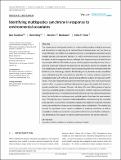Identifying multispecies synchrony in response to environmental covariates
Abstract
The importance of multi-species models for understanding complex ecological processes and interactions is beginning to be realised. Recent developments, such as those by Lahoz-Monfort et al. (2011), have enabled synchrony in demographic parameters across multiple species to be explored. Species in a similar environment would be expected to be subject to similar exogenous factors, although their response to each of these factors may be quite different. The ability to group species together according to how they respond to a particular measured covariate may be of particular interest to ecologists. We fit a multi-species model to two sets of similar species of garden bird monitored under the British Trust for Ornithology’s Garden Bird Feeding Survey. Posterior model probabilities were estimated using the reversible jump algorithm to compare posterior support for competing models with different species sharing different subsets of regression coefficients.There was frequently good agreement between species with small asynchronous random effect components and those with posterior support for models with shared regression coefficients; however, this was not always the case. When groups of species were less correlated, greater uncertainty was found in whether regression coefficients should be shared or not.The methods outlined in this paper can test additional hypotheses about the similarities or synchrony across multiple species that share the same environment. Through the use of posterior model probabilities, estimated using the reversible jump algorithm, we can detect multi-species responses in relation to measured covariates across any combination of species and covariates under consideration. The method can account for synchrony across species in relation to measured covariates, as well as unexplained variation accounted for using random effects. For more flexible, multi-parameter distributions, the support for species-specific parameters can also be measured.
Citation
Swallow , B T , King , R , Buckland , S T & Toms , M P 2016 , ' Identifying multispecies synchrony in response to environmental covariates ' , Ecology and Evolution , vol. 6 , no. 23 , pp. 8515-8525 . https://doi.org/10.1002/ece3.2518
Publication
Ecology and Evolution
Status
Peer reviewed
ISSN
2045-7758Type
Journal article
Description
BTS was part funded by EPSRC/NERC grant EP/10009171/1.Collections
Items in the St Andrews Research Repository are protected by copyright, with all rights reserved, unless otherwise indicated.

